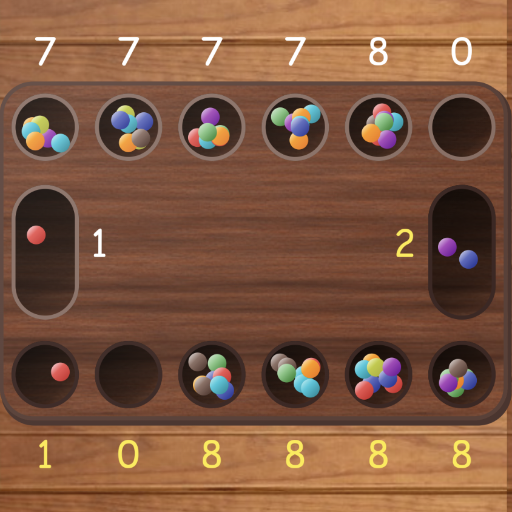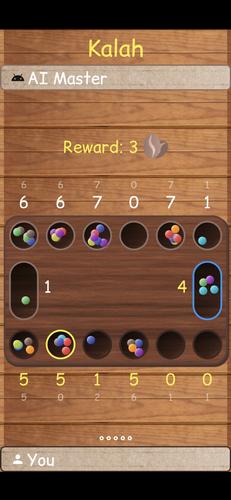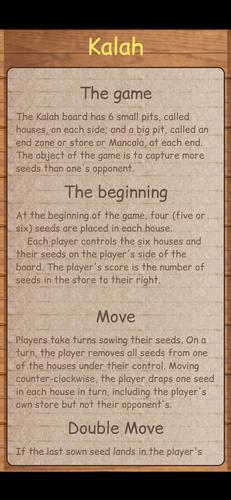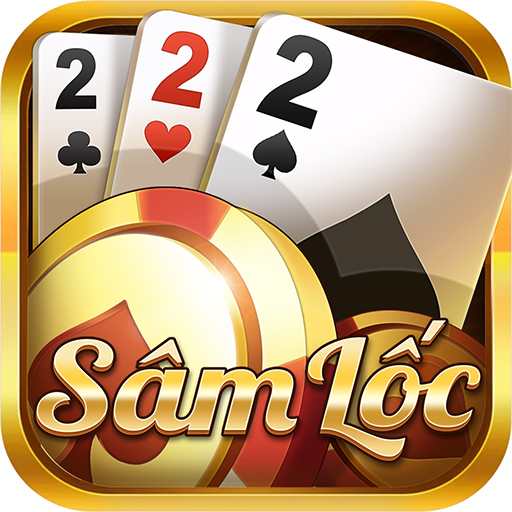Mancala games are a beloved family of two-player, turn-based strategy board games traditionally played using small stones, beans, or seeds and a board with rows of pits or holes. The primary goal is typically to capture more of your opponent's pieces than they capture of yours. (Wikipedia)
This game collection includes several popular mancala variants such as kalah, oware, and congkak—offering an engaging and strategic experience for players of all ages.
The standard board features six small pits (commonly referred to as "houses") on each side, and one larger pit at each end known as the store or end zone. The ultimate objective in most variations is to collect more seeds in your store than your opponent does in theirs.
Kalah Rules Overview:
- Setup: Each house starts with four seeds (sometimes five or six).
- Control: Each player controls the six houses on their side of the board. A player’s score is represented by the number of seeds in their store located on the right side of the board.
- Turn Play: On a player’s turn, they select one of their houses, remove all seeds from it, and distribute them counter-clockwise—one seed per house—including their own store but not their opponent's.
- Capture Rule: If the last seed dropped lands in an empty house owned by the player, and the opposite house contains seeds, both the last seed and the seeds in the opposite house are captured and placed into the player’s store.
- Bonus Move: If the last seed lands directly in the player’s store, that player earns an additional move. There is no limit to how many extra moves can be taken during a single turn.
- End of Game: The game ends when a player has no seeds left in any of their houses. The opposing player then moves all remaining seeds in their houses to their store. The winner is the player with the most seeds in their store.
Oware Rules Summary:
- Initial Setup: Each house begins with four seeds (occasionally five or six). Players control the six houses on their respective side of the board. The score is determined by the total number of seeds collected in the store.
- Sowing Mechanic: On a turn, the player picks up all seeds from one of their houses and distributes them counter-clockwise into subsequent houses. Seeds are not placed into scoring stores or the starting house if it contained exactly one seed. If the starting house had 12 or more seeds, it is skipped, with the twelfth seed going into the next house.
- Capturing Mechanism: Captures occur only when the final seed sown brings an opponent's house to exactly two or three seeds. In this case, the seeds in that house are captured. Additionally, if the previous seed also resulted in an opponent’s house having two or three seeds, those are captured as well, continuing backward until a house with a different count or a non-opponent house is reached. All captured seeds go into the capturing player’s store.
- Starvation Rule: If all of a player's houses are empty, the opponent must make a move that gives them seeds. If no such move exists, the current player captures all remaining seeds in their territory, ending the game immediately.
- Game End Conditions: The game concludes when one player has captured more than half of the total seeds, or both players have captured exactly half (resulting in a draw).
What’s New in Version 1.4.1
Updated on August 6, 2024 – Various bug fixes implemented to enhance gameplay stability and user experience.




















